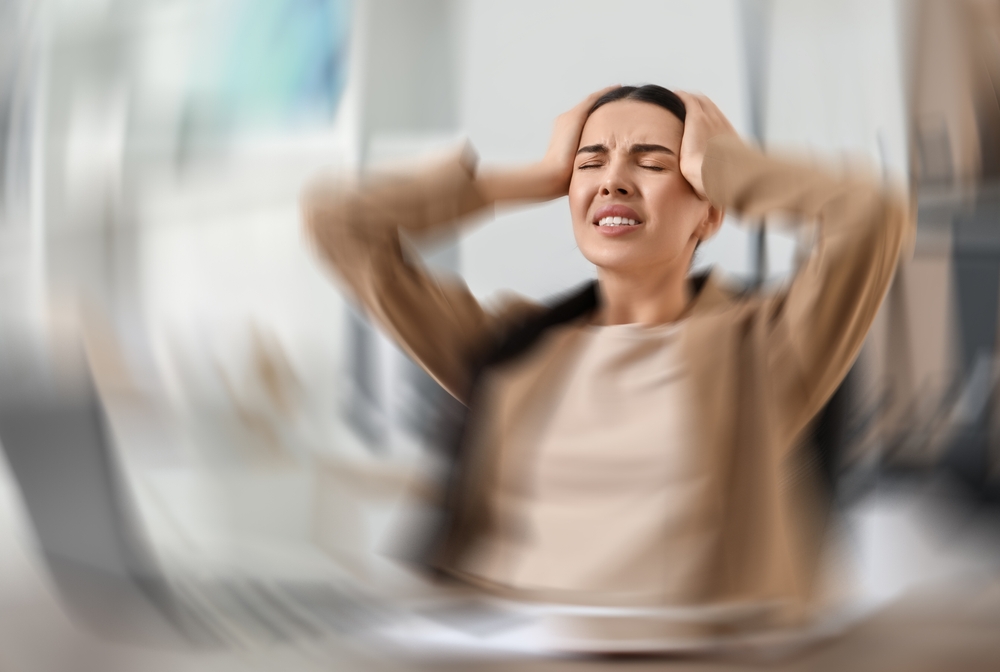Last Updated:
July 21st, 2025
Dizziness and Headaches Caused by Addiction
Dizziness might not seem like a major concern at first because we all feel a bit lightheaded now and then. But when you’re feeling dizzy all the time, especially if it’s linked to drug or alcohol use, it can be a worrying sign that there is a bigger problem. Substance abuse, addiction and withdrawal can all impact how your brain and body function and feeling dizzy may be one of the first red flags. If you or someone you love is experiencing regular dizziness, understanding the connection with drug or alcohol addiction can stop more serious issues from developing.

What is dizziness?
Dizziness, also referred to as vertigo or disequilibrium, is when you feel lightheaded, unsteady on your feet or like the room is spinning around you. It can feel like a floaty, nauseous feeling that can come quickly, creep up slowly and last for a few seconds or for hours at a time.
Dizziness isn’t a condition on its own but is usually a symptom of some underlying issue. It could be caused by dehydration, low blood sugar, illness, overexertion or, in the context of this page, drug or alcohol use. Substances can affect the parts of your brain that help you stay balanced, leading to dizzy spells.
Some people also feel dizzy during withdrawal, especially when the body is adjusting to being without the drug it has relied on. It’s not always easy to tell where dizziness is coming from, but if it keeps happening, especially with other symptoms, it’s important to take it seriously.
How can addiction cause dizziness?
Dizziness can come and go quickly, but when it’s linked to addiction, it is rarely a random event. Many substances affect the systems in your body that help you stay balanced and coordinated, and when those systems get thrown off, they can throw you completely off kilter.
For example, dizziness after drinking alcohol heavily is very common. Alcohol affects the brain’s balance system and can cause spinning sensations (vertigo), especially after prolonged, excessive drinking or during withdrawal. Long-term alcoholism can also damage nerves that contribute to frequent dizzy spells, even when you’re sober.
Stimulants like cocaine or meth increase your heart rate and blood pressure quickly. This can overwhelm your body and lead to lightheadedness, especially when the drugs start wearing off or during the resulting crash.
Opioids can cause drops in blood pressure and slow your breathing, both of which may make you feel faint or woozy. This is especially dangerous when you take opioids in high doses or at the same time as other substances.
Prescription drugs like benzodiazepines, sleeping tablets or antidepressants can also cause dizziness, especially if you take them in large doses or with alcohol or other drugs. Depending on the specific medicine, you might feel foggy, spaced out or like you’re floating along.
Whatever substances you have been using, if you are feeling dizzy more often than usual, don’t brush it off. It is always better to be safe than sorry and to get professional advice to make sure it’s not something serious.
What are some common signs of dizziness to look out for?
Dizziness can show up in different ways and may come with other physical symptoms that are important to recognise to stay safe. This is especially true if you are going through withdrawal or if you are using substances heavily and at risk of overdose. Here are some signs you should take seriously:
When to see a doctor about dizziness
Dizziness is not a feeling that comes by itself but is usually a symptom of something going on under the surface. Skipping meals, stress, or overexerting yourself during sports or exercise can all cause temporary dizziness, which usually goes away with no lingering issues.
However, dizziness can also be caused by abnormal health conditions like a migraine, ear infection, heart problem, concussion, low blood pressure, stroke, seizure, dehydration, epilepsy and alcohol and drug addiction.
Whatever the cause, you are always advised to see a doctor as soon as you begin to notice any of the following symptoms alongside dizziness:
Seeing a doctor is particularly important in the case of individuals who abuse or are addicted to drugs because waiting it out can often make things far worse.

Can dizziness be dangerous if left unaddressed?
When you feel dizzy, your first thought might be that it will pass or that it’s just because you skipped breakfast or stood up too fast. But if it keeps happening, especially if you’re using drugs or alcohol, dizziness could be pointing to something far more dangerous.
Ignoring persistent dizziness can lead to serious consequences like falling, fainting or being unable to focus properly in situations that require attention. It can also be a sign that your heart, brain or nervous system is being affected by drugs or alcohol in a dangerous or even fatal way.
Getting help early is key, and you don’t need to know exactly what’s causing your dizziness to get a professional opinion. Getting the right support now can help you avoid bigger risks down the line and start addressing the underlying causes before things spiral.
What should I do if a loved one or I is experiencing dizziness from addiction?
If you’ve been feeling dizzy and suspect it’s connected to drugs or alcohol, Addiction Helper can help you understand what’s going on. Most importantly, you don’t ignore the issue because things can get out of hand faster than you think. Whether you need advice on addiction, rehab treatment or just healthier living, contact us today, and we will give you expert advice and support.
Our compassionate team are ready and available to take your call, and guide you towards lasting the lasting addiction recovery you deserve.

